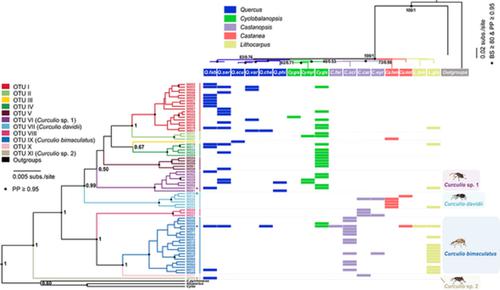当前位置:
X-MOL 学术
›
Insect Conserv. Divers.
›
论文详情
Our official English website, www.x-mol.net, welcomes your
feedback! (Note: you will need to create a separate account there.)
High diversity and strong variation in host specificity of seed parasitic acorn weevils
Insect Conservation and Diversity ( IF 3.2 ) Pub Date : 2020-11-19 , DOI: 10.1111/icad.12462 Qian‐Ya Li 1 , Xing‐Hua Hu 1, 2 , De‐Chen Liu 1 , Ao Ouyang 1 , Xin Tong 1 , Yong‐Jin Wang 1 , Rong Wang 1, 3 , Xiao‐Yong Chen 1, 3
更新日期:2020-11-19
Insect Conservation and Diversity ( IF 3.2 ) Pub Date : 2020-11-19 , DOI: 10.1111/icad.12462 Qian‐Ya Li 1 , Xing‐Hua Hu 1, 2 , De‐Chen Liu 1 , Ao Ouyang 1 , Xin Tong 1 , Yong‐Jin Wang 1 , Rong Wang 1, 3 , Xiao‐Yong Chen 1, 3
Affiliation

|
- Host specificity of phytophagous insects plays a critical role in the maintenance of plant diversity. However, a lack of approaches to identify the larvae of phytophagous insects, which usually have similar morphology, can lead to misinterpretation of their host ranges.
- Acorn weevils are seed‐exploiting parasites of Fagaceae species, a dominant plant group in subtropical evergreen broad‐leaved forests (EBLFs). Therefore, variation in their host specificity may profoundly influence plant diversity in this ecosystem.
- Here, we collected larvae of acorn weevils from 36 655 seeds of Fagaceae species in EBLFs in southeastern China and performed multiple operational taxonomic unit (OTU) delimitation analyses using one mitochondrial (COI) and two nuclear (ArgK and EF1‐α) genes to reveal species composition of acorn weevils and assess the variation in host specificity among OTUs.
- We analysed the DNA barcoding sequences from 478 larvae and 4 adults of acorn weevils sampled from 17 common Fagaceae species (five genera) and detected 11 OTUs. Moreover, host range varied drastically among different OTUs, with Curculio bimaculatus being the most generalised.
- Our results revealed high diversity of acorn weevils and that strong variation in host specificity can even exist among OTUs in the same genus, addressing the need to distinguish different Curculio species before conducting forest management in EBLFs.











































 京公网安备 11010802027423号
京公网安备 11010802027423号